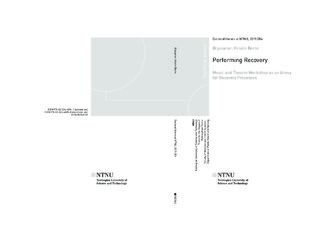Performing recovery. Music and theater workshop as an arena for recovery processes
Abstract
Introduction: In order to support people with mental health problems to live meaningful and valuable lives, there has been a growing interest in mental health services providing activities that focus on resources rather than illness and problems. Although this research is in its infancy, performing arts in community-based mental health services appears to promote recovery. Limited knowledge exists on performing arts and recovery in mental health contexts. To address this knowledge gap, this thesis explores how performing arts in a mental hospital, supports recovery processes for people with long-term mental health problems.
Method: In this thesis, a qualitative hermeneutical-phenomenological framework was used. Data was gathered through informal observation and in-depth interviews with 12 people who were, or had been, participants in a music and theatre workshop located within a Norwegian mental hospital. The three published articles in this thesis build on each other and use different approaches to analyse the thick and complex data.
Findings: Participants in the music and theatre workshop met flexible, solution-oriented and person-centred arts professionals. Together, they created a non-judgmental, accepting and exploratory environment. Despite participants sharing challenging personal life stories and dealing with different existential questions, they experienced the music and theatre workshop as a free zone; free from diagnosis and therapy. In this free zone where the participants conducted laborious creative work on their personal stories and existential questions, transformation processes that supported central recovery processes occurred. The participants were provided with new experiences of their own identity and their being in the world. They were given an opportunity to face new challenges and risks, which provided them an opportunity to develop new skills and increased self-efficacy. Furthermore, they experienced glimpses of positive moments and a vision of a different existence, that could be picked up as the threads of a new life.
Conclusion: The music and theatre workshop became a free zone where the participants were allowed to be simultaneously fragmented, dysfunctional, resourceful and creative. In this free zone they performed recovery. Accessibility and flexibility, belonging and ownership and the way that participants engaged with the professionals had an impact on whether the music and theatre workshop was experienced as a free zone with transformative potential for recovery. However, providing a music and theatre workshop in a mental hospital creates challenges at organizational, structural and human levels.
Has parts
Paper 1: Ørjasæter, Kristin Berre; Ness, Ottar. Acting Out: Enabling Meaningful Participation among People with Long-Term Mental Health Problems in a Music and Theater Workshop. Qualitative Health Research 2017 ; Volum 27.(11) s. 1600-1613Paper 2: Ørjasæter, Kristin Berre; Davidson, Larry; Hedlund, Marianne; Bjerkeset, Ottar; Ness, Ottar. “I now have a life!” Lived experiences of participation in music and theater in a mental health hospital. PLoS ONE 2018 ;Volum 13.(12) s. 1-15
Paper 3: Ørjasæter, Kristin Berre; Stickley, Theodore; Hedlund, Marianne; Ness, Ottar. Transforming identity through participation in music and theatre: exploring narratives of people with mental health problems. International Journal of Qualitative Studies on Health and Well-being 2017 ;Volum 12. Suppl. 2 s. -
